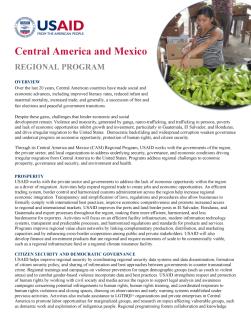Over the last 20 years, Central American countries have made social and economic advances, including improved literacy rates, reduced infant and maternal mortality, increased trade, and generally, a succession of free and fair elections and peaceful government transitions.
Despite these gains, challenges that hinder economic and social development remain. Violence and insecurity, generated by gangs, narco-trafficking, and trafficking in persons, poverty and lack of economic opportunities inhibit growth and investment, particularly in Guatemala, El Salvador, and Honduras, and drive irregular migration to the United States. Democratic backsliding and widespread corruption weaken governance and undercut progress on economic opportunity, protection of human rights, and citizen security.
Through its Central America and Mexico (CAM) Regional Program, USAID works with the governments of the region, the private sector, and local organizations to address underlying security, governance, and economic conditions driving irregular migration from Central America to the United States. Programs address regional challenges to economic prosperity, governance and security, and environment and health.

